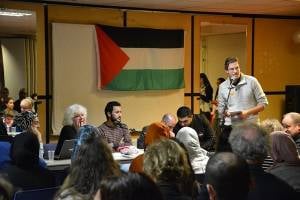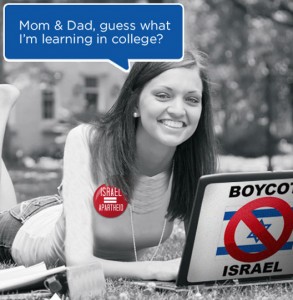
Debate on an academic boycott of Israel staged by “Students for Justice for Palestine” in Amsterdam on January 13. (Photo: Facebook)
This article by Abigail R. Esman was originally published by The Gatestone Institute. Esman, a freelance writer based in New York and the Netherlands, is the author of Radical State: How Jihad Is Winning Over Democracy in the West (Praeger, 2010).
Amsterdam’s pro-Palestinian student group, Studenten for Rechtvaardig Palestina [SRP], demands an academic boycott against Israel.
The four people gunned down in Paris on January 9 had not even been buried yet – four men murdered by a Muslim terrorist just for being Jews – when Amsterdam’s pro-Palestinian student group demanded an academic boycott against Israel.
Not that they are anti-Semitic – not a bit, insists Studenten for Rechtvaardig Palestina [SRP], which models itself on the American Students for Justice in Palestine, an organization that accuses Israel of genocide. A leader of the group, Sarah (who would not give her last name to reporters, she said, for fear of reprisals), declared, rather, “I find anti-Semitism terrible. We are against it, and we said so from our first informational meeting.
‘Israel as Bad as Islamic State’
I find Israel as bad as Islamic State,” she continued, “and I am Muslim myself.”
Comparing Israel, the sole democracy in the Middle East and a country regularly subjected to terrorist attacks, to the Islamic State [ISIS, IS] would be surreal under any circumstances, but even more so when four European Jews have just been killed by Muslims and when IS has not only applauded their murders, but called on Muslims everywhere to commit more.
But it is not, it turns out, inexplicable.

The SRP’s outburst was set off by the decision last week by Amsterdam’s Vrij Universiteit [VU] (Free University), to cancel a previously planned “debate,” called by SRP, to encourage the school to join the international academic boycott against Israel. This debate, to which not a single pro-Israel speaker had been invited, was to have taken place the following day at VU. The debate was to be led by former Dutch Socialist Party member Anja Meulenbelt, wife of convicted former Fatah terrorist Khaled Abu Zaid. Abu Zaid, by his own description, once trained fellow Palestinians in the use of explosives against Israeli targets.
Also scheduled to speak at the event was the Dutch-Iraqi journalist Abulkasim al-Jaberi, who recently blamed the Paris attacks on French imperialism. “Were France not part of the trigger-happy international Mafioso, this would never have happened,” he wrote in an article for the online publication Voorbeeld allochtoon (Exemplary Immigrant).
To their credit, before cancelling the “debate,” VU president Jaap Winter announced that the university had no intention of conceding to the SRP’s demands; rather, he said, they felt it appropriate that an academic institution provide “open and honest debates over difficult, sensitive, and controversial issues, such as the Palestinian question.”
The failure of the SRP to offer a real debate – rather than one-sided, propagandist arguments – was not, however, the reason VU revoked their permit for the event. Rather, university officials said, “We have determined that, in light of social unrest in response to the events of last week, this debate could engender feelings of insecurity and exclusion with the university community.” Why such concerns were not raised by the presence at the event of the Dutch wife of a convicted Palestinian terrorist remains a mystery – at least formally.

(Photo: campusintifada.com)
Nevertheless, Sarah and her fellow SRP members quickly found an alternative site: the peaceful-sounding Nelson Mandela Center in Amsterdam.
The Nelson Mandela Center, however, is merely the name of a building. It houses the offices of (among others) Holland’s Euro-Mediterranean Center for Migration and Development [EMCEMO], a Dutch-Moroccan organization that has been accused of urging Dutch Moroccans to resist efforts to crack down on welfare fraud by Moroccan immigrants. More pointedly, last August, as Dutch-Moroccan extremists chanted “death to Jews” during pro-ISIS demonstrations in The Hague, EMCEMO called on Holland’s Jews to distance themselves from Israel. In the end, by all accounts, the evening passed relatively peacefully, other than the arrest of one attendee who allegedly issued threats against another.
‘Naive or Really Vicious’
This, however, does not mean that the issue has played itself out. Far from it. In America and Europe, from politicians to universities, ongoing efforts to demonize and alienate Israel continue. Yet, as Esther Voet, executive director of Holland’s Jewish rights organization, the Center for Information and Documentation Israel [CIDI], pointed out in a recent phone conversation:
“To all those people who waste their energy now on the BDS [Boycott, Divest, and Sanctions] movement, I would say, first, you are either naive or really vicious. And second, ask yourself why you are focusing on Israel and not on the vicious stuff that is going on right now in the rest of the world. If you want to fight for something in this world, fight for the incredible, beautiful civilization that we have – the civilization of freedom.”
The recent attacks in Paris made clear the threat we all live under now, but more, they made clear that Israel is the only place on earth where Jews – especially European Jews – are truly safe. To call for an end to Israel, or for an end to its sovereignty, is now, more glaringly than ever, to call for an end to the Jews.
Let’s stop pretending that it’s not.




